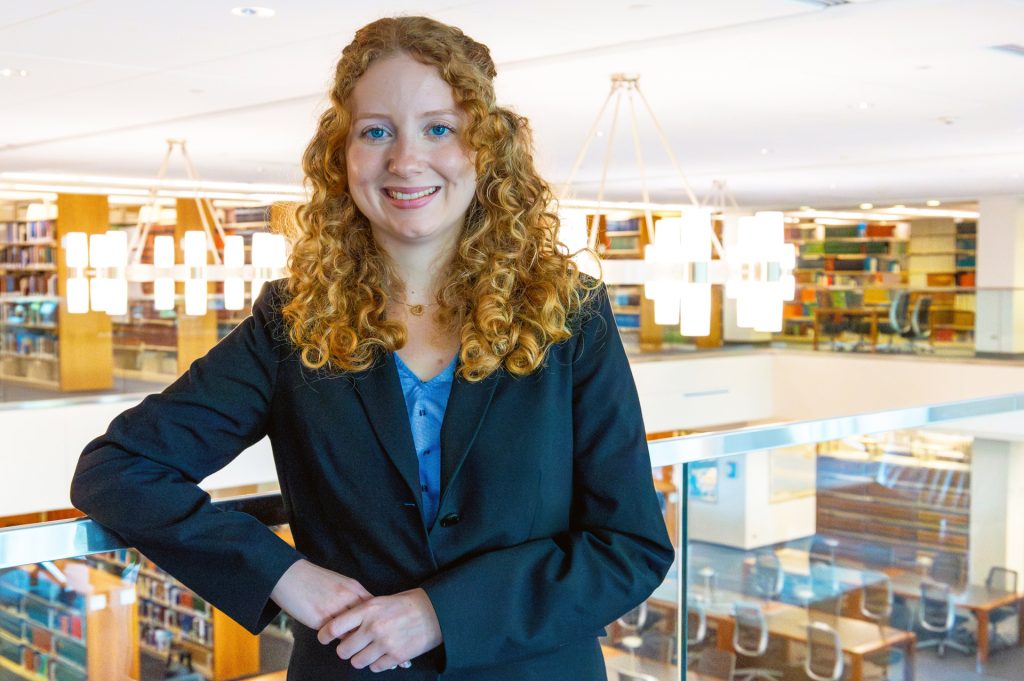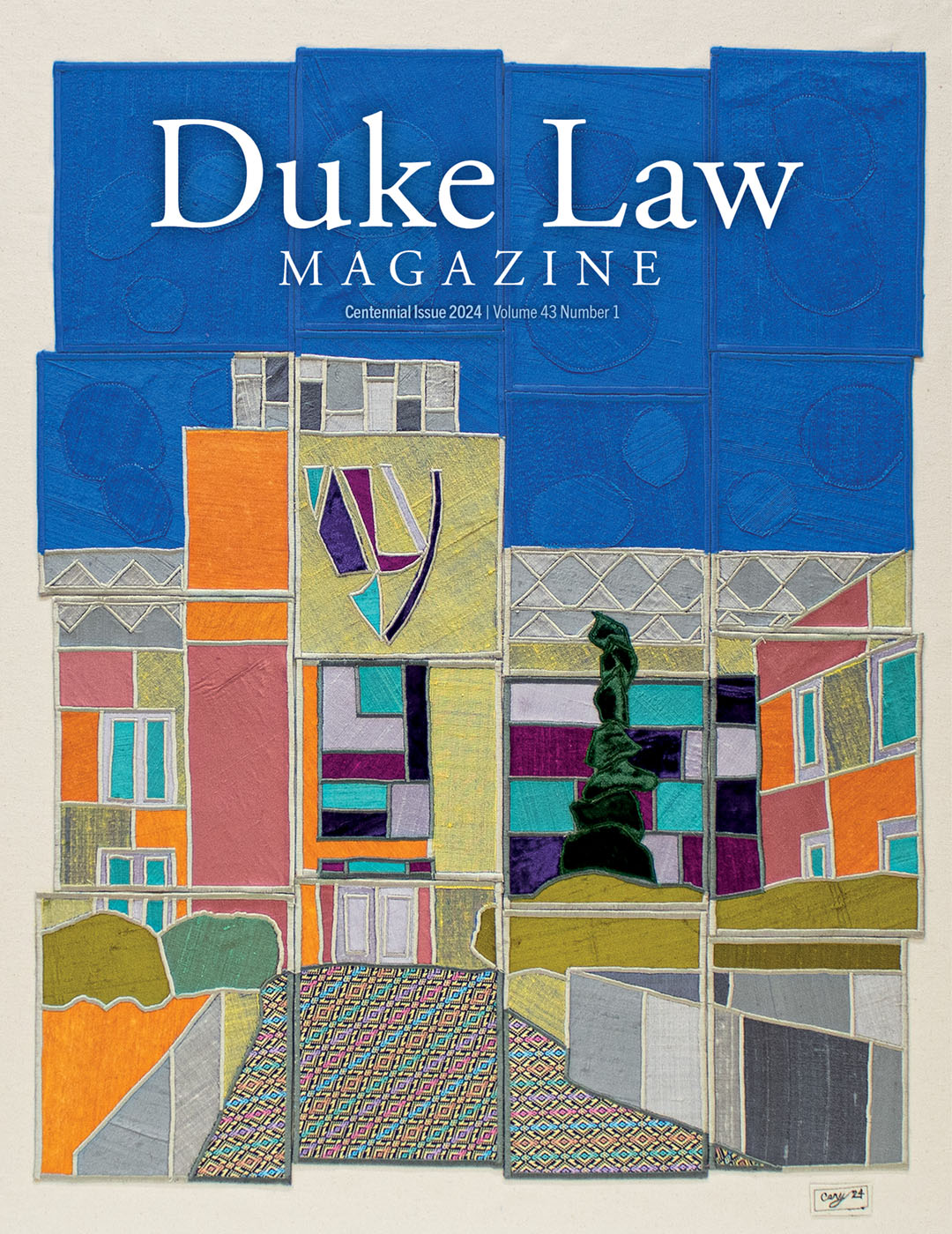
Alumni Profile
April Alex
April Alex ’24 has often sought opportunities to make a direct impact on the lives of those around her.
She was an undergraduate student at the University of Houston when Hurricane Harvey struck the Texas coast in 2017. The deadliest hurricane to hit the state in 100 years, the ensuing storm devastated southeast Texas, dropping up to 60 inches of rain and leaving catastrophic flooding in its wake. The following summer, Alex began an internship at Disability Rights Texas, advocating on behalf of people affected by the storm. She worked directly with clients, many of whom were people with disabilities, managed their cases, and wrote demand letters to FEMA seeking funds and recovery care. “A lot of people were houseless or living in homes that were completely destroyed or had really bad mold problems, but they were running into problems with FEMA and different organizations on getting recovery care,” Alex said.
That experience drew Alex toward the domestic side of legal work. She was also exposed to advocacy at home.
Growing up with deaf parents, Alex had a firsthand view of the challenges facing members of the hearing-impaired community as they navigated daily life and sought and established accessible accommodations in her hometown of Victoria, Texas, a small city about two hours southwest of Houston and 30 miles inland from the Gulf of Mexico.
Her mother, she said, had a fire in her to organize. Alex recalls tagging along to a community meeting at the local Starbucks where her mother led a discussion on petitioning the cinema for caption nights. She watched her act as an interpreter on behalf of others, help them draft requests for interpreters during medical appointments, and assist with calls to insurance companies. She was there for resource meetings where her mother would walk community members through the process of applying for things like license plates with a deaf notification on it.
“I don’t think I realized until I was in high school that my mom was doing what lawyers do. She was acting as an advocate.”
It was fun to tag along, she said, but also difficult to see so much unmet need in a world that does not always consider those with differing abilities. An estimated 42.5 million Americans, or 13% of the population, experience difficulties with hearing, vision, mobility, cognition, self-care, or independent living, according to the Pew Research Center.
“I don’t think I realized until I was in high school that my mom was doing what lawyers do. She was acting as an advocate,” Alex said.“I thought, it’s so beautiful that she does this for her friends and her community, but I want to do this in every aspect of my life.”
That motivation has guided her choices through her undergraduate studies and through her time at Duke Law where, serendipitously, she had the opportunity to continue advocating for individuals close to home.
In the fall of her 2L year, Alex learned that Duke Law’s Wilson Center for Science and Justice, under the direction of Brandon Garrett, the L. Neil Williams, Jr. Distinguished Professor of Law, was seeking a research assistant who would be tasked to the ODonnell Consent Decree, a misdemeanor bail reform agreement covering Harris County, Texas, a jurisdiction of five million people that includes Houston, the third largest city in the U.S.In March 2020 Garrett was appointed to monitor reforms implemented as part of a settlement reached after three years of federal litigation that found the county’s bail practices unconstitutional. Alex was familiar with the case from her time in Houston and jumped at the opportunity to help make an impact so close to home.
“I knew going into law school that I’d have the opportunity to do pro bono work, but I didn’t think I would have the opportunity to make a difference in the place that I love. It was important to me to maintain that tie. As soon as I could, I did,” Alex said.
As part of the monitorship, Wilson Center staff are responsible for aggregating and monitoring comprehensive data from the new system by watching bail hearing videos and listening to arguments in the courts from both the prosecution and magistrate. They’ve also tracked how long people have stayed in jail to analyze whether they’ve been detained in violation of the rules. It’s a level of human monitoring that wouldn’t otherwise be afforded without the aid of law students like Alex, according to Garrett.
“We didn’t have an automated system to check how many hours people had been in jail and assess whether there was a reason for that, or whether they were being held too long,” Garrett said.
“April did the painstaking work of checking records by hand and watching hours of bail hearing videos. That’s the ‘unglamorous’ side. But she also helped us with describing our findings to a broader audience through reports and law review articles. All of it is critical to the project and our mission, and we are so grateful for her assistance.”
In a presentation on her experience with the Wilson Center to the Duke Law Board of Visitors, Alex described the work as “just part of all the great things the center does.”
Alex has always considered Houston home, and that made it especially meaningful to continue her involvement in the community, which she began as an undergraduate volunteer, through her work with the Wilson Center.
“My heart is more on what I can see around me, the issues in my own community. I want to make more of an impact there. It could be from my background, of seeing the change that my mom had on her friends and her community. But that’s where I want to put my time,” said Alex.
Diving into new experiences at Duke Law while maintaining a strong connection to her roots was pivotal in Alex’s trajectory as a student. In addition to her assistantship, she also participated in the Children’s Law Clinic, was vice president of the Health Law Society, and served as staff editor for Law and Contemporary Problems.
This fall, Alex joined Phelps Dunbar in Raleigh, where she plans to focus on healthcare, workers’ rights, and insurance work.
“I think that everything is connected,” Alex reflected. “I do think my experiences here at Duke are taking me toward more of a public interest-looking career. I love engaging in the community. I think that’s shown throughout my different interest points, and I think that’s important to a lot of law students here. It’s just about finding those ways in which you can do it best.” — Hayley Foran

